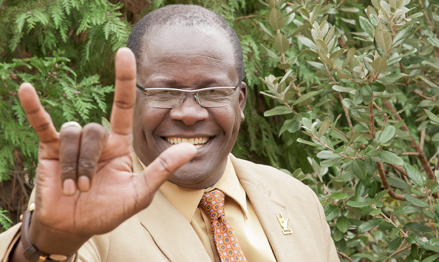Latest News Archive
Please select Category, Year, and then Month to display items
02 January 2025
|
Story Gerda-Marie van Rooyen
|
Photo Supplied
 Leading the research in South Africa is Prof Linus Franke from the Department of Soil, Crop and Climate Sciences.
Leading the research in South Africa is Prof Linus Franke from the Department of Soil, Crop and Climate Sciences.
Scientists are actively pursuing the successful breeding of diploid hybrid potatoes from inbred lines. This is expected to revolutionise potato breeding as it holds the key to rapid genetic progress. It will introduce new varieties for commercialisation through seed. Currently, existing potato variants have a gene that renders self-pollinated seeds infertile.
Prof Linus Franke, an academic in the Department of Soil, Crop and Climate Sciences at the UFS, is leading the research in South Africa. “This technology allows the production of genetically uniform potato seed that is easy to transport and largely disease-free.” He says this differs from conventional breeding whereby only vegetative propagation is possible due to tetraploid varieties in potatoes. It also risks carrying pests and diseases from one generation to the next – leading to the accumulation of pests and diseases with each round of multiplication.
Seed innovation
Prof Franke explains that Solynta BV, a seed company based in the Netherlands that produces potato varieties that can be grown from seed, has included South Africa in their research efforts because it is one of Africa’s largest producers and exporters. Through his academic relationship with Wageningen University and Research, a Dutch institution renowned for its agricultural endeavours and food production, the UFS became involved in researching hybrid potatoes grown from seed.
Diploid seeds containing two sets of chromosomes allow easier gene manipulation to increase predictability and speedier genetic progress. The breeding approach enables the incorporation of tolerance to pests, diseases, abiotic stresses (cold, heat, drought) and other desired genetic traits.
Although Prof Franke is optimistic about this research, he is not blind to disadvantages. “Potato seeds are tiny and have little energy reserves, making it harder to grow potatoes from seed than from tubers.” He says potatoes from seed will take longer to cultivate than tubers, as farmers need to grow plantlets from seeds first, adding six weeks to the growing period. “It is possible that commercial farmers can grow potatoes directly from seed. Alternatively, perhaps more likely, specialised growers will produce tubers of potatoes from seed; these tubers are then sold as seed tubers to other potato farmers, who then continue their normal practices of producing potatoes for the market from tubers.”
Financial benefits
Prof Franke says farmers have reason to get excited. “Seed potatoes will reduce input costs, as varieties with enhanced tolerance to pests and diseases require less pesticides. Planting one hectare of potatoes requires three to four tonnes of potato tubers, but only one 25 g packet of potato seeds.” Since potatoes are a more valuable commodity than maize, this technology might also increase farmers’ income potential.
National accolade for Dr Philemon Akach
2013-10-21
|
 |
|
Dr Philemon Akach
Photo: Sonia Small
21 October 2013 |
Excellence in Teaching and Learning is highly regarded at the University of the Free State, with our academics recognised on national and international platform.
Earning yet another accolade for the university, Dr Philemon Akach, Head of the Department of South African Sign Language, has been awarded a National Excellence in Teaching and Learning Award. The award by the Higher Education Learning and Teaching Association of Southern Africa (HELTASA) and Council on Higher Education (CHE), recognised Dr Akach as a “leader in the field of teaching and learning – with impact beyond the classroom and the institution.” Recognising his pioneering work within deaf education, HELTASA and CHE commend Dr Akach as an “inspirational practitioner who recognises the inclusion of the marginalised in education.”
Dr Akach is one of five recipients, selected out of a total of 22 candidates from across South Africa that will receive the award. The other winners are from the University of Cape Town, Stellenbosch University, University of KwaZulu-Natal and the University of Pretoria. The five winners will receive the awards at a gala dinner at the annual HELTASA conference, which takes place from 26 to 29 November 2013.
Dr Akach, who will retire at the end of 2014, says the national recognition is the cherry on top as he prepares to return to his home country. Kenya. “How good can it be?” “This is my life calling,” he said about the 37 years he worked within deaf education.
The academic also received an Alumni Award for Outstanding Service at the recent Kovsie Alumni Awards.
Pioneering work by Dr Akach:
- With Dr Akach steering the process, the UFS became the first university on the continent to offer Sign Language as an academic course in 1999.
- Dr Akach was part of a nine-member task team that handed over the South African Sign Language (SASL) curriculum to the Minister of Basic Education, Angie Motshekga. A member of the ministerial task team since 2009, he helped to coordinate the development of the curriculum that will soon be offered as a school subject to Grade 0–12 learners in all 42 schools for the deaf in South Africa.